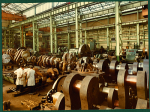Porthandbuoy
Well-known member
Think we’ll ever see engines like this in our boats? Or has it been tried before?
Opposed Piston Diesel Engines Are Crazy Efficient
Opposed Piston Diesel Engines Are Crazy Efficient


Yes, whilst not practical range for all yet, electric drives will predominate in futureThe days of reciprocating engines is coming to an end.
Must have been designed by the same chaps who came up with the Antikythera mechanism !Every few years someone reinvents the design, but nobody is interested. The practical problems outweigh the theoretical gains. Piccy is the Deltic timing gears. View attachment 110209
Dream on!The days of reciprocating engines is coming to an end.
Maybe when the government has built some power stations and a new National Grid to charge all those batteries. Until then, electric powered cars will remain on the fringes, unless your country has hydro-electric like Norway.Yes, whilst not practical range for all yet, electric drives will predominate in future
Those massive boxboats must still be the least polluting way of moving stuff, per ton, per mile though.The er... bigger ... picture:
‘Transitional fuels are capturing the regulatory agenda and incentives’: Maersk - Splash247
The days of reciprocating engines is coming to an end.
Those massive boxboats must still be the least polluting way of moving stuff, per ton, per mile though.
It's impossible for a layman, me at least, to tell how much of that piece is practical marine engineering likely to be adopted, and how much is big organisations being seen to be green.
Presumably huge engine-room alterations will be needed, or even dedicated new future ships.
The wholesale move to electric heating - new gas connections are shortly to be banned - won;t help one little bit either. An honest government (of any hue) would be announcing the building of new nuclear stations at the same time as they announced phasing out of fossil fuels.Maybe when the government has built some power stations and a new National Grid to charge all those batteries. Until then, electric powered cars will remain on the fringes, unless your country has hydro-electric like Norway.
We Scots have been watching in dismay the attempts of CMAL to introduce two new dual fuel ferries. Which are years late, 100% over budget - and will do three-quarters of stuff-all to reduce CO2 emissions, not least since, ever they ever actually run on LNG, they will requite two tankers full per day to come by road from SE England to supply the stuff.The er... bigger ... picture:
‘Transitional fuels are capturing the regulatory agenda and incentives’: Maersk - Splash247
Yes, per ton mile it is much the best.
There is a spat brewing between Maersk (and DFDS) on the one hand and CMA CGM on the other.
Maersk look to me to be entirely serious about moving to a carbon free state. I am myself convinced that ammonia is, at the moment, the best way to carry hydrogen - “blue” or otherwise - around the place, and Maersk are doing the right thing. Bio ethanol is less clear cut.
CMA CGM have gone for methane which is a bit of a fraud, as methane itself is a dreadful greenhouse gas and of course burns* to produce CO2.
* most of it does. “Methane slip” is a big issue which the methane lobby don’t like to talk about.
I have no connection with Maersk.
Royal Dutch Shell announced to the market last week it's new strategy to be carbon neutral by 2050 for all of it's products including end users. All the IOCs have some form of commitments to reduce carbon, but RDS is the first to state the carbon neutral approach. They stated that it is their customers asking for this solution as well as the consumer market. RDS will reduce oil production by 2% per year and increase gas production as a transition strategy. In the meantime, as the largest forecourt operator in the world, they are moving to install electric charge points. There is a lot more to the announcement, including repurposing refineries for different fuel types, lobbying and working with their biggest clients to develop solutions, airlines, shipping and heavy land transport being markets that need to address carbon neutral issues. We shall see.